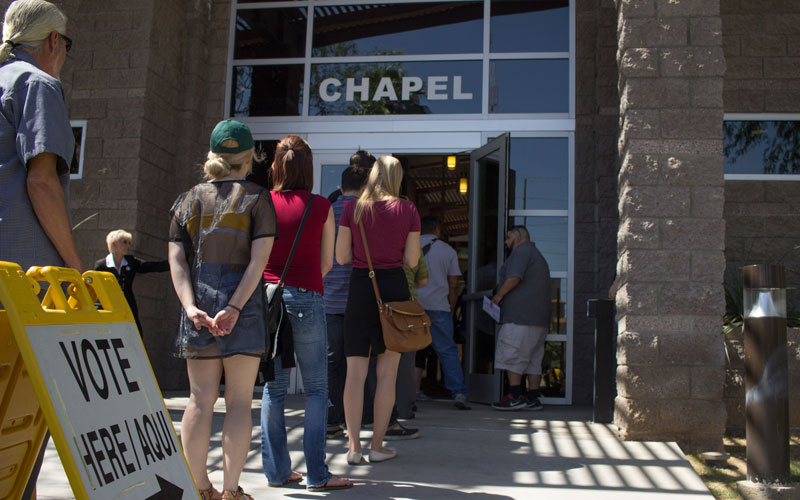Top Maricopa County elections officials told the Board of Supervisor in February they had decided to reduce polling places in the presidential preference election to 60 to make the election “as cheap as humans could do it.”
Read more:
Fewer polling places, independent voters causing long lines on Arizona election day
Arizona Secretary of State predicts large turnout for presidential preference election
Cheers, chants and dismay mark Arizona election night watch parties
Storify: Live coverage of Arizona presidential preference election
Cost efficiency was necessary because it did not have the funds to cover the costs of the election, County Recorder Helen Purcell told the board.
“We don’t just do this in a vacuum,” Purcell told the board according to a video recording of the meeting. “We have said for a number of months looking at the county and where our early ballots are and where we have large enough polling places. … We’ve done some scientific study and I think our people are very good.”
A contrite Purcell appeared before the board again Wednesday, the day after the March 22 election, accepting “full responsibility,” according to azcentral.com, for a county presidential preference election in which hundreds of people stood in line for as long as five hours.
Some voters were still in line at midnight, hours after the polls closed Tuesday, long after Donald Trump and Hillary Clinton were predicted winners of the Republican and Democratic races in Arizona.
At the Feb. 17 meeting, one of the five supervisors raised questions about the number of polling places, according to the video.
Steve Gallardo asked Purcell and Elections Director Karen Osborne why they decided on 60 polling places when there were 200 available in 2012 and unlike that election, Democrats also would be voting.
“Why 60 … Why not 80, why not 100?” Gallardo asked.
Osborn said the county and state were an all-mail ballot, and estimated 95 percent of eligible voters would vote by mail rather than show up at the polls.
“We have had, at your direction, to try and keep the presidential preference as cheap as humans could do it,” Osborne said.
Purcell said “only 800,000” registered Democrats and Republicans were eligible to vote.
Gallardo said he still would have liked “to see a bit more,” polling places, pointing out the high interest in the presidential race might spur a record number of in-person voting and wondered how voters reliant on public transportation might get to a reduced number of polling places.
“For a county this large, the fifth largest county in the country … maybe this is the magic number,” Gallardo said, appearing to not be entirely convinced.
Purcell and Osborne were lauded for being innovative in allowing any voter to go to any polling place, according to the video.
Supervisor Chairman Clint Hickman thanked Purcell and Osborn for being frugal.
